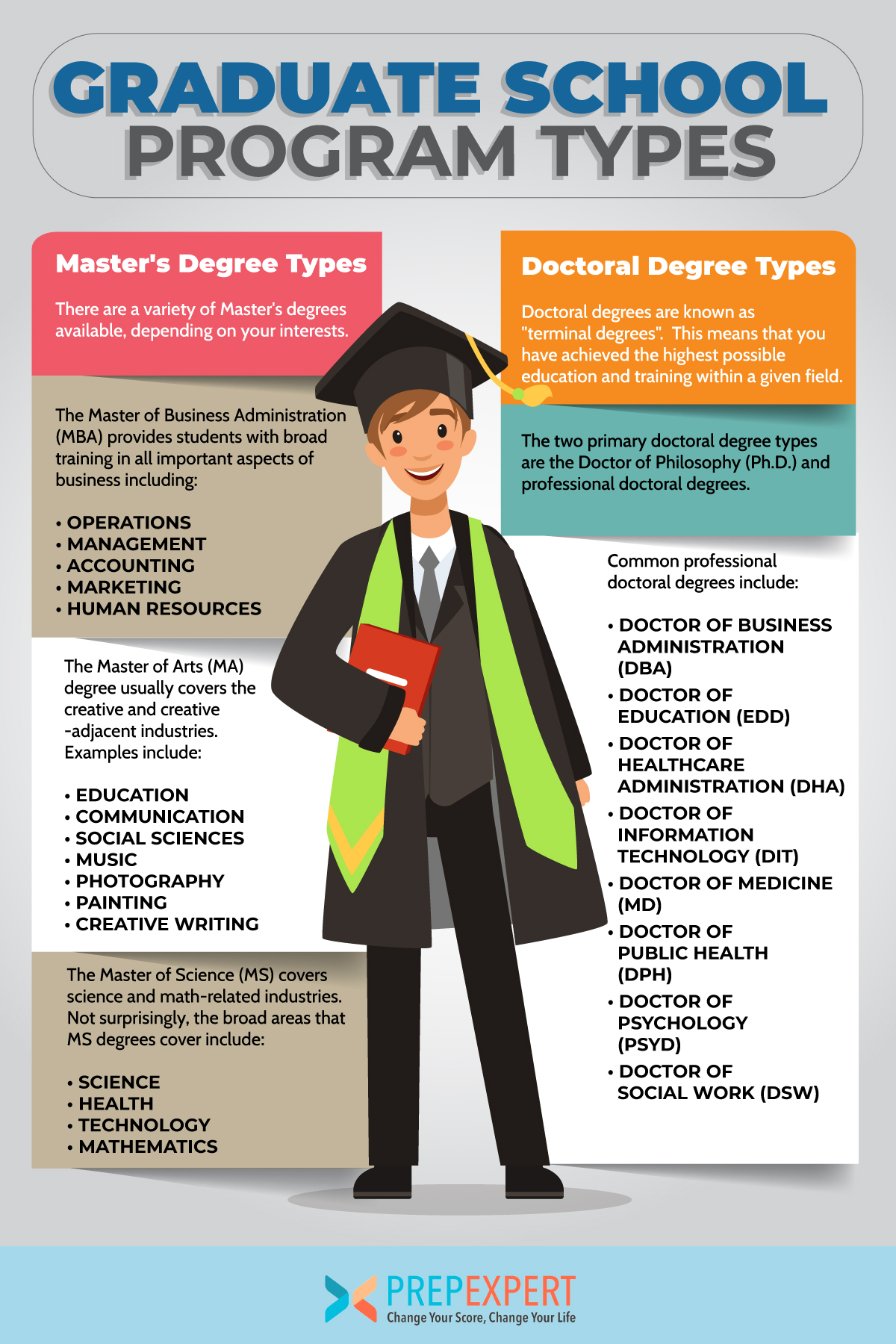Graduate School Program Types
After four years of high school, you graduate with a high school diploma. After two to four years of undergraduate study, you receive a bachelor’s or associate’s degree. What comes next?
Take a moment to review the primary graduate school program types available after receiving your college undergraduate degree.
Learn how to prepare for standardized tests with our year-round SAT prep and ACT prep courses today.
Graduate Degree Type Basics
Here’s what all graduate school programs have in common.
Before going into all of the differences, let’s look at what all graduate degrees have in common first. The first step is examining whether you’re looking at a master’s or doctorate degree.
Normally, you can complete a master’s degree within two years and can pursue it immediately after undergraduate study. A doctorate degree is more challenging to obtain, hence the greater professional and social value.
Completing a non-medical doctorate program can take, at minimum, four years to complete. A medical doctorate will take even longer. Doctorates also have greater requirements, with the largest being your dissertation or final research project.
Prepare for many hours of research and writing to simply prepare your dissertation. Because of the incredible amount of work and effort required for them, only approximately 2% of Americans possess a doctorate degree.
Occupations that require one include:
- Medical Doctor
- Lawyer
- Professor
- Research Scientist
- Psychologist
- University President
Master’s Degree Types
There are a variety of Master’s degrees available, depending on your interests.
There are many different Master’s degree programs available at virtually every college or university. One of the most common is the Master of Business Administration, better known as the ‘MBA’.
Other ones you’ll hear discussed are the Master of Arts (MA) and Master of Science (MS). Let’s look at each of them real quick.
The Master of Business Administration (MBA) provides students with broad training in all important aspects of business including:
- Operations
- Management
- Accounting
- Marketing
- Human Resources
Often, students that have a particular skill set in mind will choose that as a concentration for their degree.
The Master of Arts (MA) degree usually covers the creative and creative-adjacent industries. Examples include:
- Education
- Communication
- Social Sciences
- Music
- Photography
- Painting
- Creative Writing
If your career path involves the arts in any significant way, you’ll probably go after an MA.
Finally, the Master of Science (MS) covers science and math-related industries. Not surprisingly, the broad areas that MS degrees cover include:
- Science
- Health
- Technology
- Mathematics
Social sciences sometimes offer an MS option, which normally requires candidates to focus much more heavily on research than their MA counterparts.
It’s not uncommon for other subjects to have this MA and MS crossover; however, the MS track will require more research overall.
Students who are pursuing a Master’s degree in a new field will often go with the MA. Candidates pursuing a Master’s in their undergraduate major often go with the MS option.
Doctoral Degree Types
Here is the most difficult graduate program option available.
Doctoral degrees are known as “terminal degrees”. This means that you have achieved the highest possible education and training within a given field.
The two primary doctoral degree types are the Doctor of Philosophy (Ph.D.) and professional doctoral degrees. The Doctor of Philosophy degree trains students to do perform academic work within their chosen discipline, including research and university-level teaching.
Students gain knowledge within a specialized area while developing their academic research skills. Ph.D. programs are normally structured around specific classwork followed by an exam. Students must pass the exam in order to continue.
From that point, candidates begin working on their dissertation and immerse themselves in research. During that process, students may have to meet additional requirements including:
- Submitting papers to academic publications
- Academic conference presentations
Doctorate programs take significantly more time to complete. On average, you should expect to spend at least 4-6 years pursuing a Ph.D.
Besides the Ph.D., professional doctorate degrees focus specifically on career skills. Students learn how to use research to find solutions to problems within their career field.
Most professional doctorate candidates already work in their chosen fields and are looking to further advance their skill sets. These students are looking to advance their career prospects to the highest possible level.
Common professional doctoral degrees include:
- Doctor of Business Administration (DBA)
- Doctor of Education (EdD)
- Doctor of Healthcare Administration (DHA)
- Doctor of Information Technology (DIT)
- Doctor of Medicine (MD)
- Doctor of Public Health (DPH)
- Doctor of Psychology (PsyD)
- Doctor of Social Work (DSW)
For more test strategy, college admissions, and scholarship application tips sign up for our FREE class happening right now!
Graduate School Program Types FAQ
How long does it take to earn a master’s degree?
Normally, you can complete a master’s degree within two years and can pursue it immediately after undergraduate study.
What is an MBA?
The Master of Business Administration (MBA) provides students with broad training in all important aspects of business including Operations, Management, Accounting, Marketing, and Human Resources.
What is a Ph.D.?
The Doctor of Philosophy degree trains students to do perform academic work within their chosen discipline, including research and university-level teaching.
What are professional doctorate degrees?
Professional doctorate degrees focus specifically on career skills. Students learn how to use research to find solutions to problems within their career field. Most professional doctorate candidates already work in their chosen fields and are looking to further advance their skill sets.
